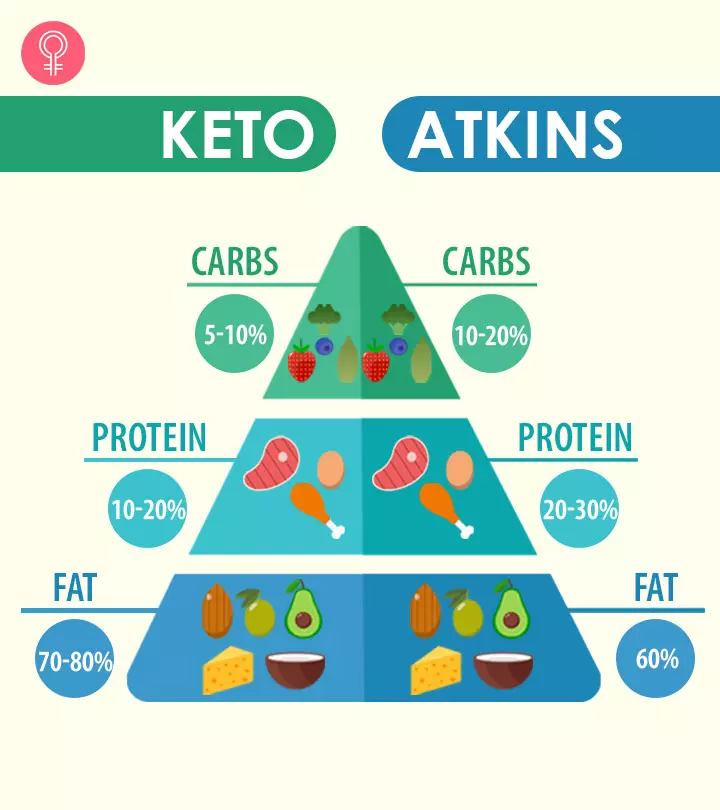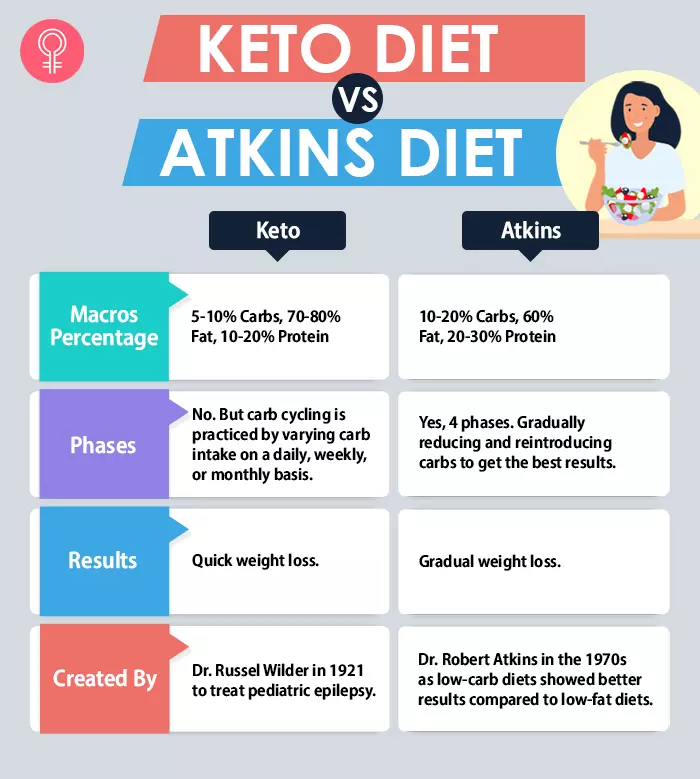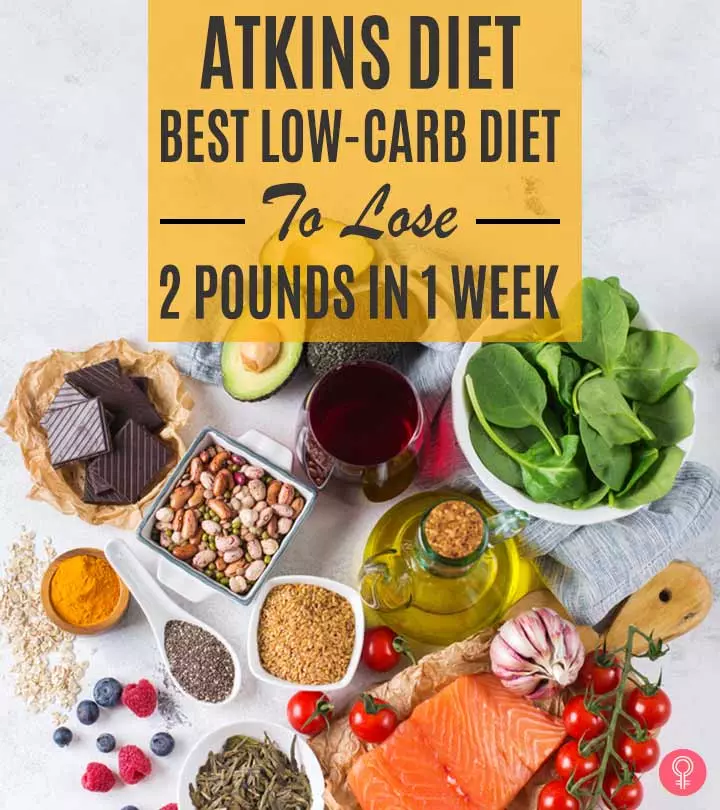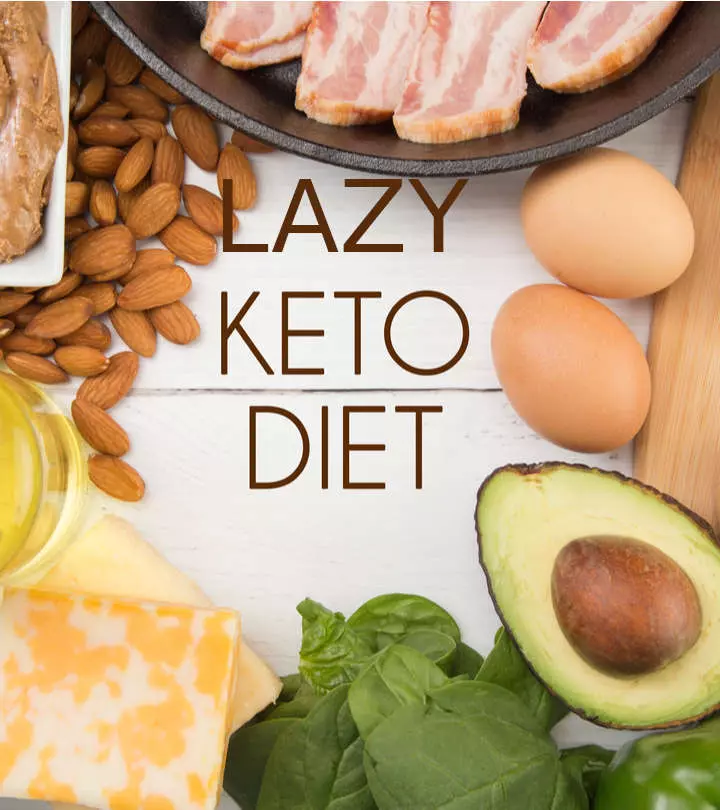Keto Vs. Atkins: Differences, Similarities, And Benefits
Know the differences between the two diets to choose one that aligns with your health goals.

Image: StyleCraze
The Atkins Vs. Keto diet debate is never-ending, although both are popular low-carb diets for weight loss. They help manage diabetes and keep the heart healthy. But why do some choose Keto and others, Atkins?
The answer lies in the division of macronutrientsi Vital nutrients like carbohydrates, proteins, and fats that the body needs in large quantities. , how each diet works, and the dieter’s medical history and wellbeing while following each diet. You can get all the details about Atkins, Keto, their differences, similarities, and benefits in this post. Read on to make an informed decision.
In This Article
What Is Atkins Diet? How Does It Work?
The Atkins diet is a low-carb, high-fat, moderate-protein diet. It was first published in the 1970s by Dr. Robert Atkins. This diet induces nutritional ketosis to produce greater weight loss results compared to low-fat diets. Ana Reisdorf, RD, says, “With Atkins after the first 2 low-carb weeks, you start to add back carbs a little at a time.” Meaning, the Atkins diet works in phases. It has 4 phases:
Phase 1: Induction: Starts with a 2-week induction phase that restricts carbohydrates to 20 grams carbs per day.
Phase 2: Balancing: The ongoing weight-loss phase slowly reduces carbohydrate intake to 12 to 15 grams per day.
Phase 3: Pre-Maintenance: The carb intake is gradually increased by adding 10 grams of carbs each week.
Phase 4: Maintenance: A level of 40 to 90 grams of carbs per day is designed to maintain weight loss.
Bryan, a blogger, shares his experience following the Atkins Diet. He writes, “I was on the diet for probably about 6-9 months. It seemed like a dream come true: meat, cheese, eggs. What more could I want? And it did work for me? It did, at least initially. I was taking weight off at a good pace. However, in the end, I did end up missing those carbs and fell off the wagon (i).” He also highlights the challenges and humor in navigating extreme diets, like Atkins, and how some sacrifices may not be worth the results.
Let us now get an overview of the keto diet and how it works. Scroll down.
Key Takeaways
- The Atkins diet and Keto diet are both low-carb, high-fat diets that use fats instead of glucose to boost metabolism and shed those extra pounds.
- Both of these diets lower blood glucose levels, help manage PCOS and psoriasis, and may reduce the risk of cardiovascular diseases and seizures.
- People with a history of kidney issues or heart diseases should not go on these diets.
What Is Keto Diet? How Does It Work?
The Keto diet is also a high-fat, low-carb, and moderate-protein diet
. It switches the body’s metabolism to use fat as the main source of fuel instead of glucose. Dr. Carly James, Ph.D., Nutritionist, says, “A keto diet is basically a diet that tries to create the state of ketosis. This is why your body uses fat as its primary fuel source in place of carbohydrates. It does this by reducing the number of carbs you eat so the body is forced to stop relying on glucose and start using fat.”
Molikov, a blogger, shares his experience with the keto diet, despite typically avoiding extreme diets. He notes, “While I set out to drop a quick 10 pounds, I quickly surpassed it. I was down 10 pounds within three weeks and hit 15 pounds two days before the wedding (ii).” He adds that he felt more energetic, and honed his creativity in the kitchen. The keto diet helped him overcome a sugar addiction, although he doesn’t plan to stay on it long-term.
If both Keto and Atkins are low-carb diets and they induce ketosis, how are they different? Read to find out.
Differences Between Keto And Atkins

While Keto and Atkins have many differences, they also have many similarities. Find out below.
Similarities Between Keto And Atkins
- Both are low-carb, high-fat diets.
- Both work by inducing ketosis where they use fat to burn fat.
- Both cause keto flu characterized by symptoms like vomiting, headache, fatigue, nausea, dizziness, difficulty in exercise tolerance, constipation, and insomnia.
- Foods consumed in both diets are similar.
- Both diets can be modified according to one’s eating habits – either vegetarian or vegan.
- Both offer important health benefits.
- The food choices and meal planning can be the same for the first two weeks of both diets. In the Atkins diet, the carbohydrate intake is increased gradually after 2nd week while it is retained as a low-carb diet in Keto.
 Quick Tip
Quick TipLet us now take a look at the research-backed health benefits of both the Ketogenic and Atkins diets.
What Are The Benefits Of Keto And Atkins?
1. Aid Weight Loss


Obesity is a global issue. It affects one’s physical and mental wellbeing. The high-fat and very low-carb nature of the Ketogenic and Atkins diets have shown promising results in weight loss. These diets change the way the body uses fuel for survival. Reducing carb intake and increasing fat consumption shifts the metabolic gear to using fat as a source of fuel (instead of using carbs). This process is known as ketosis. The body starts burning fat exponentially after ketosis sets in. It also helps suppress appetite and reduces body fat.
2. May Help Manage Diabetes
The Ketogenic and Atkins diets may also help manage type 2 diabetes. These diets are low in carbs and can help reduce blood sugar spikes. This makes it easier for the body to maintain stable blood glucose levels, thereby improving insulin sensitivity (1). Thus, the diets may help reduce body weight, reduce inflammation (acute inflammation also causes weight gain), and help lower blood glucose levels and other factors that lead to type 2 diabetes.
3. May Reduce Heart Disease Risk

Though Keto and Atkins are high-fat diets, they use high-quality fats. The fatty foods allowed in these diets are healthy and rich in omega-3 fatty acids. The diets include foods like avocado, olive oil, avocado oil, rice bran oil, nuts, and seeds. They discourage consumption of refined carbohydrates and prevent fat accumulation and reduce frequent hunger pangs as a consequence. The resultant ketosis also helps burn accumulated fat. This improves blood lipid profiles and reduces the risk of cardiovascular diseases.
4. May Help Reduce Seizures
The ketogenic diet was created as a treatment diet plan for seizures. A study conducted on 145 children with epilepsy who did not respond to antiepileptic drugs showed a 75% reduction in seizure frequency after taking a ketogenic diet. Adults with difficult-to-treat epilepsy also showed promising results with a 13 to 70% decrease in seizures after being on a keto diet.
5. May Improve Cancer Treatment Tolerance
Low-carb and high-fat diets like Keto and Atkins can also be used as adjuvant cancer therapy. Researchers believe that a ketogenic diet causes an unfavorable environment for cancer cells to thrive. Hence, the diet may help improve treatment tolerance and quality of life in individuals.
6. May Improve Brain Function

Age-related cognitive decline and neurodegenerationi A slow and progressive loss of nerve cells in the brain, which affects major body activities like balance and organ functions. can have a negative impact on the quality of life. But the Keto diet has shown promising results in improving brain function and protecting the brain from neurodegenerative diseases. Studies suggest that ketone bodies help fuel the brain even in the absence of glucose. This phenomenon may help improve the brain’s cognitive, memory, and executive functions.
7. May Improve PCOS Symptoms
The polycystic ovarian syndrome is primarily linked to insulin resistance. Irregular periods, excessive facial hair, and deeper voice are few of the symptoms. However, PCOS also puts women at risk of cardiovascular disease and type 2 diabetes. In a 12-week study, a ketogenic diet was found to help reduce blood glucose levels, total free testosterones, BMI, and LDL cholesterol. A ketogenic diet can be considered alongside medical treatment to reduce PCOS symptoms.
8. May Reduce Inflammatory Pain
Animal studies show that a high-fat diet may help reduce inflammation and joint pain. Such a diet may also reduce depressive symptoms associated with joint pain. Scientists report that the ketone bodies produced during ketosis on a high-fat diet act as a source of energy and have an anti-inflammatory effect. This effect may help reduce inflammation and pain. However, the anti-inflammatory and pain-relieving effects of the keto diet on humans is not well-studied.
9. May Reduce Acne And Manage Psoriasis

Acne and psoriasisi A chronic autoimmune condition that causes skin inflammation and itchy, scaly, and dry patches. are caused due to bacterial infection and inflammation. Excessive insulin increases male hormone production and circulation. This can lead to excess sebum production. This creates an ideal environment for bacteria to grow. A high-fat, low-carb diet like the Ketogenic diet can have insulin-lowering effects that may help reduce sebum production. A study showed that a high-fat diet, like the Keto diet, may help reduce inflammation and correct one’s metabolic status. This diet may be used as a dietary strategy to treat psoriasis.
 Quick Tip
Quick TipThese are the benefits of high-fat, low-carb diets like the Ketogenic and the Atkins diets. But which of the two is better?
Keto Vs. Atkins: Which Is Better?
Understanding your health goals can help you determine which of the two diets is better. Do you need to lose a few pounds quickly and safely, or do you want to lose the same pounds gradually and safely? Which of the two diets is more sustainable for you? Ana Reisdorf, RD, says, “Atkins is definitely more sustainable as you can begin to slowly eat more foods. But you can lose weight on either of the plans”.
When choosing between these diets, it is important to consider your lifestyle and how either approach fits into it. The keto diet demands consistent, careful tracking of carbs and a commitment to meal prepping. This can be ideal for those looking for a highly structured plan.
On the other hand, the Atkins diet allows for more flexibility, gradually reintroducing carbs over time. This can make it easier to adapt to social situations, allowing you to enjoy a wider range of foods. Ultimately, the right choice depends on what aligns best with your social and health needs.
The decision is yours. Think carefully. Talk to a registered dietitian, if required. But there’s something else you must know before you take that step.
Who Should Avoid Keto Or Atkins?
The Keto and Atkins diets have many health benefits. However, they are not meant for everyone. Ana Reisdorf, RD, says, “I would not recommend either diet for anyone with a history of disordered eating, heart disease, or liver/kidney disease. I would recommend that people with diabetes tread cautiously with this diet, especially if they are taking insulin.” The Keto diet is restrictive and does not provide balanced nutrition, thus not suitable as a long-term diet plan.
In a study conducted to evaluate the incidence of kidney stones in patients on ketogenic diets, the overall incidence of kidney stones among the 2,795 participants was found to be 5.9%. It was approximately 5.8% in children and 7.9% in adults. Further, 48.7% were uric acid stones, 36.5% were calcium-based stones, and 27.8% were mixed uric acid and calcium-based stones.
Side Effects Of The Keto Diet
While the keto diet has documented benefits, maintaining it over the long haul can be challenging. Individuals with diabetes must be cautious on the keto diet as poor management of medications like insulin may lead to dangerously low blood sugar levels.
You may also experience a few short-term side effects. These can include tiredness, headaches, dizziness, nausea, vomiting, constipation, and reduced exercise endurance (10). Fortunately, these symptoms usually improve after a few days or weeks as the body adjusts to the low-carb, ketogenic state.
However, long-term side effects of this diet may include fatty liver, kidney stones, low protein levels, and vitamin deficiencies.
Infographic: Top 5 Benefits Of Keto And Atkins Diets
Both the keto and Atkins diets have been popular among people who wish to naturally lose weight. But that is not all. Even though the two are a bit different, there are many common benefits that one can derive from following either of them. Check out the infographic below to find out what makes them so beneficial for your health
However, long-term side effects of this diet may include fatty liver, kidney stones, low protein levels, and vitamin deficiencies.
.
The Atkins vs. keto diet debate is never-ending. Both are low-carb, high-fat, and moderate-protein diets that use fat, instead of glucose, as the main source of fuel for the body. This process helps reduce blood sugar levels and the risk of type-2 diabetes. While the keto diet aids in quicker weight loss, the four-phase Atkins diet induces gradual weight loss. Both diets also help reduce the incidence of cardiovascular disease and inflammatory pains, thanks to the intake of healthy fats. However, these diets may cause keto flu in some individuals, with symptoms like fatigue, vomiting, nausea, headache, insomnia, and constipation. Remember, it is important to follow these diets under the supervision of a registered dietitian to avoid adverse effects.
Frequently Asked Questions
Is Atkins easier than keto?
Atkins is less restrictive than keto hence more sustainable over a longer period of time. It is challenging to remain in ketosis, and most people who believe to be following the keto diet are on a low-carb diet. The Atkins diet focuses on sustainability for the long-term effect.
Can I eat Atkins on keto?
Atkins diet is similar to keto in the first two weeks of induction phase. You can eat similar low-carb meals.
Can I lose weight on Atkins without exercise?
While exercise can help boost the process, you can still lose some weight with just the Atkins diet.
Illustration: Keto Vs. Atkins: Differences, Similarities, And Benefits

Image: Dall·E/StyleCraze Design Team
Confused between the keto and Atkins diets? Put your doubts aside with this detailed video that explains their main differences and similarities to help you decide for yourself. Click play to learn more!
Personal Experience: Source
StyleCraze's articles are interwoven with authentic personal narratives that provide depth and resonance to our content. Below are the sources of the personal accounts referenced in this article.
i. Crazy Atkins Diet Experiencehttps://dadintheheadlights.wordpress.com/2008/01/21/crazy-atkins-diet-experience/
ii. Tried Keto diet for 30 days result was insane..
https://medium.com/@molikovdesign/tried-keto-diet-for-30-days-result-was-insane-e7d7ee346803
References
Articles on StyleCraze are backed by verified information from peer-reviewed and academic research papers, reputed organizations, research institutions, and medical associations to ensure accuracy and relevance. Read our editorial policy to learn more.
- Low Carbohydrate Diet
https://www.ncbi.nlm.nih.gov/books/NBK537084/ - Ketogenic Diet
https://www.ncbi.nlm.nih.gov/books/NBK499830/ - Atkins Diet
https://www.sciencedirect.com/topics/medicine-and-dentistry/atkins-diet - Defining the Optimal Dietary Approach for Safe, Effective and Sustainable Weight Loss in Overweight and Obese Adults
https://www.ncbi.nlm.nih.gov/pmc/articles/PMC6163457/ - Ketogenic Diets and Pain
https://www.ncbi.nlm.nih.gov/pmc/articles/PMC4124736/ - Beyond weight loss: a review of the therapeutic uses of very-low-carbohydrate (ketogenic) diets
https://idp.nature.com/authorize?response_type=cookie&client_id=grover&redirect_uri=https%3A%2F%2Fwww.nature.com%2Farticles%2Fejcn2013116 - Obesity and inflammation: the linking mechanism and the complications
https://www.ncbi.nlm.nih.gov/pmc/articles/PMC5507106/ - Effect of the ketogenic diet on glycemic control, insulin resistance, and lipid metabolism in patients with T2DM: a systematic review and meta-analysis
https://www.ncbi.nlm.nih.gov/pmc/articles/PMC7705738/ - Effects of Ketogenic Diets on Cardiovascular Risk Factors: Evidence from Animal and Human Studies
https://www.ncbi.nlm.nih.gov/pmc/articles/PMC5452247/ - Ketogenic Diet and Epilepsy
https://www.ncbi.nlm.nih.gov/pmc/articles/PMC6836058/ - Ketogenic diet in the treatment of cancer – Where do we stand?
https://www.ncbi.nlm.nih.gov/pmc/articles/PMC7056920/ - A Ketogenic Diet Improves Cognition and Has Biochemical Effects in Prefrontal Cortex That Are Dissociable From Hippocampus
https://www.ncbi.nlm.nih.gov/pmc/articles/PMC6286979/ - Are ketogenic diets promising for Alzheimer’s disease? A translational review
https://alzres.biomedcentral.com/articles/10.1186/s13195-020-00615-4 - Effects of a ketogenic diet in overweight women with polycystic ovary syndrome
https://translational-medicine.biomedcentral.com/articles/10.1186/s12967-020-02277-0 - Osteoarthritis and a high-fat diet: the full ’OA syndrome’ in a small animal model
https://arthritis-research.biomedcentral.com/articles/10.1186/ar3082 - Managing Rheumatoid Arthritis with Dietary Interventions
https://www.ncbi.nlm.nih.gov/pmc/articles/PMC5682732/ - Ketones the ketogenic diet, and the skin: a review of where we are and where we should go.
https://www.pulsus.com/scholarly-articles/ketones-the-ketogenic-diet-and-the-skin-a-review-of-where-we-areand-where-we-should-go.pdf - Effect of Very-Low-Calorie Ketogenic Diet on Psoriasis Patients: A Nuclear Magnetic Resonance-Based Metabolomic Study
https://pubs.acs.org/doi/10.1021/acs.jproteome.0c00646 - Advantages and Disadvantages of the Ketogenic Diet: A Review Article https://www.ncbi.nlm.nih.gov/pmc/articles/PMC7480775/
Read full bio of Dr. Sandeep Jassal
Read full bio of Arshiya Syeda
Read full bio of Aparna Mallampalli



























Community Experiences
Join the conversation and become a part of our empowering community! Share your stories, experiences, and insights to connect with other beauty, lifestyle, and health enthusiasts.